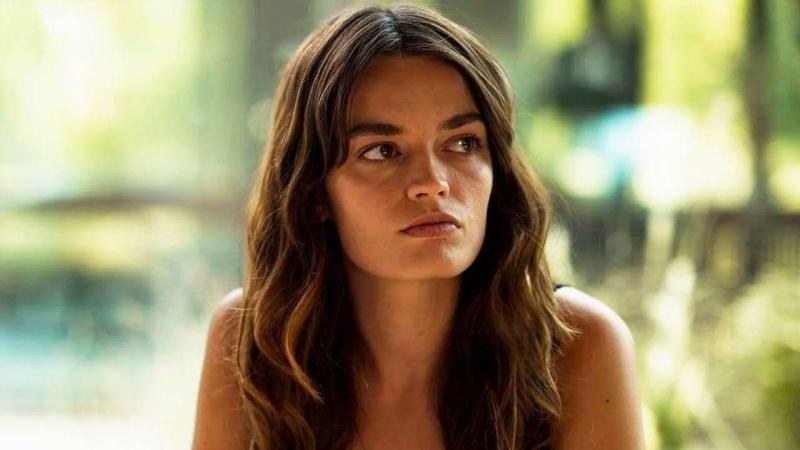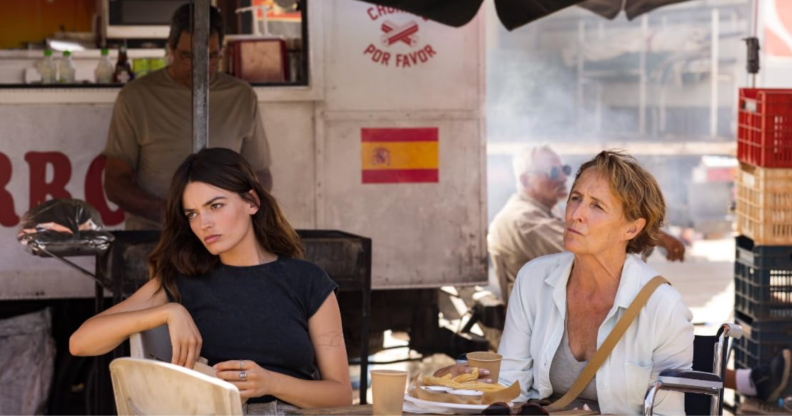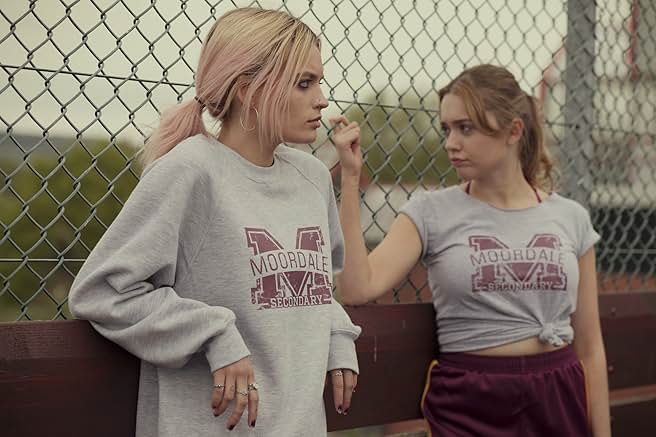theartsdesk Q&A: actor Emma Mackey on 'Hot Milk' and life education | reviews, news & interviews
theartsdesk Q&A: actor Emma Mackey on 'Hot Milk' and life education
theartsdesk Q&A: actor Emma Mackey on 'Hot Milk' and life education
The Anglo-French star of 'Sex Education' talks about her new film’s turbulent mother-daughter bind

Emma Mackey might have had her breakthrough role as a teenage tough cookie in Netflix's hit Series Sex Education (2019-20223), but there is also a disarming softness in her; a balanced mix of femininity and subtly fierce determination that made her the perfect choice as Emily Brontë in Frances O'Connor's 2022 biopic about the author’s journey to womanhood.
In the same year, the French-British actor starred in Death on the Nile, the second of Kenneth Branagh’s Hercule Poirot mysteries. She is currently filming a fantasy drama with JJ Abrams. But what pushes Mackey back into the centre of attention right now is her role as Sofia in Rebecca Lenkiewicz's Hot Milk alongside Fiona Shaw and Vicky Krieps
Adapted by Lenkiewicz from Deborah Levy's novel, the drama revolves around the fraught relationship of anthropology doctoral candidate Sofia and her apparently psychosomatically disabled mother, Rose (Shaw). They have left London for Almeria, where Rose (Shaw) has booked treatment by a spiritual healer-cum-psychotherapist (Vincent Perez) to cure her of the mysterious condition that left her unable to walk when Sofia was four.
In Spain, the sun blazes, the wind blows. While the hypercritical Rose seems to celebrate Sofia's vulnerability, Sofia begins to rebel against her carer role, She reaches for liberation in an affair with the enigmatic Ingrid (Krieps), only to find Ingrid is haunted that befell her in childhood.
Hot Milk premiered at the Berlinale in February, when Mackey sat down to reflect on her character, the complexities of family ties, and the importance of finding your own feet in life.
PAMELA JAHN: Is it an illusion that we're able to free ourselves from our family and what they expect of us?
EMMA MACKEY: Perhaps it is a false idea, but maybe it's also just part of the fabric of being human. It's part of the process of life. If you look at Sofia when we meet her in the film, she's totally lost in her desires and wishes. She studies anthropology to understand other people, but she knows nothing about herself, except that she cares for her mother. Weirdly, it's the only thing she's got a grip on. There's a real fight happening. They're bound together because of Rose's physical condition, but the situation becomes almost unbearable for Sofia. It's too much – too overwhelming. It's that constant push and pull between the two characters that we were trying to explore. (Pictured below: Emma Mackey and Fiona Shaw)
 Would you call it an actual fight?
Would you call it an actual fight?
Yes, on different levels. There is something painfully ridiculous in the way they behave. Of course, Rose's story is very distressing, and part of that is carried through into Sofia feeling estranged and not fitting in anywhere. But at the same time, there's this real bond between mother and daughter in that they have thrust themselves into an extraordinary situation by going abroad and seeking help from this mysterious doctor, who's their last hope. No matter how much they are silently fighting with each other and with themselves, what unites them beyond their family tie is that they both want to live. However clumsy they may be doing it, at least they try.
Do you personally believe in the power of spiritual healing?
That's quite a big question. I also think the term itself means something different for everyone, just as faith and religion are not the same thing. What Rose goes through in the film would probably be seen more as an alternative healing method. She realises that what she thought was a physiological condition is deeply linked to her past, all the lies and the secrets, the trauma and mental baggage that she's repressed for so long.
Rose might be the obvious patient, but Sofia is equally in need of healing.
Absolutely, whether spiritual or not. They both need to find happiness again. However, as Sofia says at some point, it is a choice. You must choose a better life for yourself. You must choose to love again and not stay inside and suffer.
The narrative almost plays out like an ancient tragedy, don't you think?
It certainly has a theatrical feel to it, like something you can find in Greek tragedy, especially the ending. But I also like the idea of the mirror as an agent of reflection, in the way that Rose needs to look at herself and within herself to be able to let Sofia go. She's disappointed in her, but she does love her.
Can you relate to the awakening that Sofia goes through?
There have been a few moments like that. I remember coming to the end of university, when I decided to take up acting officially. I called my parents saying, "This is it, this is my project. I'm going to do it, and you don't have to worry about me any more. You can trust me." I was about to move to London, to go into the world, and of course I was scared, but I knew I had to make it on my own.
And you did by landing a breakthrough role in Sex Education.
It was the best school, literally, because you're acting all these scenes every day and you don't really have time to worry about anything. It was wonderful, a real ensemble piece. We were all just starting out. I was so innocent as well. I had nothing to compare it with. But it seems I made the right choice. (Pictured below: Emma Mackey, left, and Aimee Lou Wood in Sex Education)
 This time you're working alongside Vicky Krieps and Fiona Shaw. How was that?
This time you're working alongside Vicky Krieps and Fiona Shaw. How was that?
I came in later to the project, after they were already attached, so that was a real draw for me. I was so thrilled at the idea of being able to play with them. Interestingly, our relationship in the film developed quite organically, just as we got to know each other behind the camera. I was also in a very fortunate position because I didn't have to lead. Sofia is always watching what other people do. She experiences life in that way without really having any gumption - at least until she meets Ingrid.
What was it that got you excited about cinema and film in the first instance?
At first, I was an avid reader. But I also listened to the radio a lot. I loved those English radio plays, BBC dramas. And we also watched films all the time. I was particularly obsessed with Star Wars and would act out certain scenes on the playground and in primary school. But back then, I never saw it as a career opportunity or something. I just loved the stories. It was only as I got older that I realised people get paid to do this and there is a whole industry behind it.
As you are half French, how much of a European are you compared to your kind of your British identity?
I grew up in France, and I feel very European. But as I was younger, there were times when I looked at the UK, specifically British culture and art, through rose-tinted glasses. You always miss that other home when you're not there. I felt like in between at the time. Even now, people ask me, which football team I root for in the World Cup? And I'm always wondering, why do I have to choose? They're both great. For me, it's a win-win situation. I've made my peace with it over the years. I've lived in both countries now and feel a lot more balanced in that regard.
Explore topics
Share this article
The future of Arts Journalism
You can stop theartsdesk.com closing!
We urgently need financing to survive. Our fundraising drive has thus far raised £49,000 but we need to reach £100,000 or we will be forced to close. Please contribute here: https://gofund.me/c3f6033d
And if you can forward this information to anyone who might assist, we’d be grateful.

Subscribe to theartsdesk.com
Thank you for continuing to read our work on theartsdesk.com. For unlimited access to every article in its entirety, including our archive of more than 15,000 pieces, we're asking for £5 per month or £40 per year. We feel it's a very good deal, and hope you do too.
To take a subscription now simply click here.
And if you're looking for that extra gift for a friend or family member, why not treat them to a theartsdesk.com gift subscription?
more Film
 Blu-ray: The Graduate
Post #MeToo, can Mike Nichols' second feature still lay claim to Classic Film status?
Blu-ray: The Graduate
Post #MeToo, can Mike Nichols' second feature still lay claim to Classic Film status?
 Little Trouble Girls review - masterful debut breathes new life into a girl's sexual awakening
Urska Dukic's study of a confused Catholic teenager is exquisitely realised
Little Trouble Girls review - masterful debut breathes new life into a girl's sexual awakening
Urska Dukic's study of a confused Catholic teenager is exquisitely realised
 Young Mothers review - the Dardennes explore teenage motherhood in compelling drama
Life after birth: five young mothers in Liège struggle to provide for their babies
Young Mothers review - the Dardennes explore teenage motherhood in compelling drama
Life after birth: five young mothers in Liège struggle to provide for their babies
 Blu-ray: Finis Terrae
Bleak but compelling semi-documentary, filmed on location in Brittany
Blu-ray: Finis Terrae
Bleak but compelling semi-documentary, filmed on location in Brittany
 Oslo Stories Trilogy: Sex review - sexual identity slips, hurts and heals
A quietly visionary series concludes with two chimney sweeps' awkward sexual liberation
Oslo Stories Trilogy: Sex review - sexual identity slips, hurts and heals
A quietly visionary series concludes with two chimney sweeps' awkward sexual liberation
 Sorry, Baby review - the healing power of friendship in the aftermath of sexual assault
Eva Victor writes, directs and stars in their endearing debut feature
Sorry, Baby review - the healing power of friendship in the aftermath of sexual assault
Eva Victor writes, directs and stars in their endearing debut feature
 Blu-ray: Who Wants to Kill Jessie?
Fast-paced and visually inventive Czech comedy
Blu-ray: Who Wants to Kill Jessie?
Fast-paced and visually inventive Czech comedy
 Oslo Stories Trilogy: Love review - freed love
Gay cruising offers straight female lessons in a heady ode to urban connection
Oslo Stories Trilogy: Love review - freed love
Gay cruising offers straight female lessons in a heady ode to urban connection
 Beating Hearts review - kiss kiss, slam slam
Romance and clobberings in a so-so French melodrama
Beating Hearts review - kiss kiss, slam slam
Romance and clobberings in a so-so French melodrama
 Materialists review - a misfiring romcom or an undercooked satire?
Writer-director Celine Song's latest can't decide what kind of film it is
Materialists review - a misfiring romcom or an undercooked satire?
Writer-director Celine Song's latest can't decide what kind of film it is
 theartsdesk Q&A: actor Leonie Benesch on playing an overburdened nurse in the Swiss drama 'Late Shift'
The Guildhall-trained German star talks about the enormous pressures placed on nurses and her admiration for British films and TV
theartsdesk Q&A: actor Leonie Benesch on playing an overburdened nurse in the Swiss drama 'Late Shift'
The Guildhall-trained German star talks about the enormous pressures placed on nurses and her admiration for British films and TV

Add comment